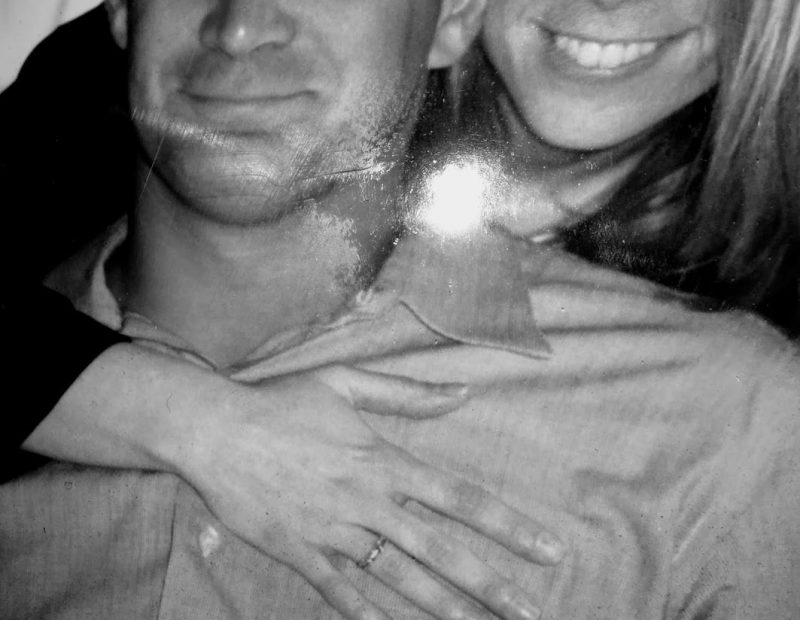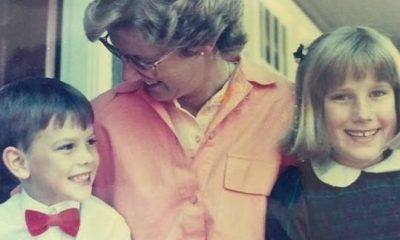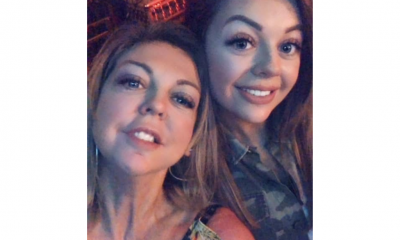By Bella Lynn Thompson
Grief is a personal path. No one can tell you how to walk on this journey. Personally, I think grief sucks! My husband died suddenly of a massive heart attack seven years ago. He was gorgeous inside and out, grounded, strong, affectionate, and funny. Whenever something was tough in our lives, he found a way to make me laugh, he was unwaveringly supportive of me and my pursuits and loved me more than life itself. When he died my world ended, every part of me hurt more than words could say. I was not at all myself for the first two years following his death. It was as if I walked around in a painful zombie state.
Watching my boys, nine and 11 years old grieve and not being able to ‘fix’ it was the worst part for me. Soon after my husband passed away (and still sometimes now), our hearts were screaming for him in what felt like every waking moment. The overwhelming feelings have subsided. Of course, I still can be hit by a ‘tsunami’ of grief. However, many days are better now than during the first few years.
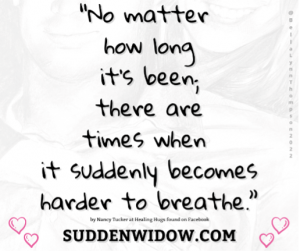
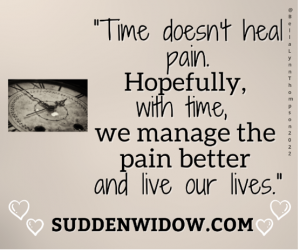
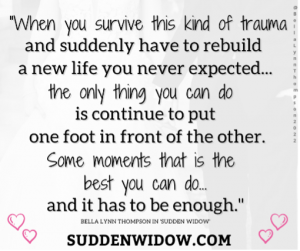
Things really can and do get better. It’s not that your grief changes. You learn to manage it better over time. I promise you can heal and get better accepting losing someone you loved so very much.
These are some suggestions that helped me feel better/heal. I hope some may be beneficial to you as well.
- Embrace your life – It’s the only one you have. Unfortunately, that means embracing terribly painful grief (I say this but there are no words to truly encapsulate the sheer agony of missing someone you love that much).
- Get moving – Figuratively and physically. I wrote a book about being a widow “Sudden Widow” and journaled. Physically, I went for walks and went to the gym. Grief can be like quicksand, you get STUCK in the overwhelming sadness, the waiting, and the “I don’t know what’s next.” It is important whenever you can to fight against this ‘stuck’ feeling and move in some way.
- Find some balance or peace if you can. – Whether you believe in a higher being or are just spiritual attempt to find a sense of peace and well-being. For me, this involved faith and accepting that there may never be an answer to why my husband passed away so relatively young. So, for me, I couldn’t keep asking why. I just accepted it did happen and started to grieve.
- Learn more about grief. – I am a psychologist, and I dealt with loss and grief as a practicing professional. I understood that healing takes a lifetime, my brain would be in a fog for some time, and my health may even be more compromised after such a shock. I knew and still know and accept I will grieve my husband’s death for the rest of my life. Special occasions will always be bittersweet, happy about the occasion and sad he is missing it. I slowly accepted this in my way and continue to accept it with new events.
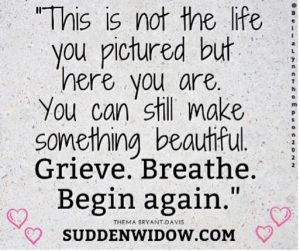
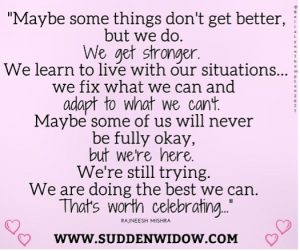

- Find what makes time go by faster. – For many people, time stops after losing someone; every minute feels like an eternity without the one you love. As your healing continues this ‘slowed’ time feeling usually gets better. I watched movies, listened to music, went shopping, exercised, spent time with people, and spent time alone, all to make me feel as if time was going faster. Well sometimes it worked, and then as more healing took place time started to move at a more ‘normal pace.’
- Forget about what people say – I hated what people would say to me. For instance, my husband’s death was a life lesson. Seriously, NO, IT WASN’T! Losing my husband was a TRAGEDY, one I had to manage but it didn’t happen to teach me something. Of course, I could still make the best of the situation.
- When you can, help others. – I’m lucky enough to have turned my experience into a book and I post on Facebook and Twitter almost daily to attempt to validate or inspire people who experienced the loss of a loved one. This makes ME feel better. My job is one of helping people and I feel I have some purpose, and this also made and makes me feel good.
- CELEBRATE your progress. – You may not always see it but over a few months or a year when you look back you will see healing and how you made it through a time you truly never thought you could.
- Start and continue self-care. – For instance, make a date night with friends, relatives, kids, or just yourself and do something you love whenever you can.

- Be grateful. – I know this can be hard, everyone can struggle with feeling grateful while you grieve, but you can feel both at the same time. I try and usually succeed at finding one too many things I am grateful for every day.
- Find validation. – I wrote my book to provide validation for some feelings people may have after losing a spouse, partner or loved one. People die every day but so many people don’t know how to deal with the person grieving. I found when I spoke to people who are widows/widowers or lost someone dear to them, I felt validated and heard and that is powerful and comforting while grieving.
- Remember your loved ones are with you in your heart, they are always part of you. So, on my worst days, I try to smile through tears holding my husband in my heart and soul and yes wishing I was holding him.
I still wake up crying sometimes, but I continue to heal at my pace and I’m grateful for that! Healing happens with work (possibly by yourself, within bereavement groups, in individual therapy, or any combination of these). I’m sending love and thoughts to everyone who needs support and I wish for progress in your grief and healing every day.
For more information about Bella, you can check out her website.
Support us by driving awareness!
Subscribe to our YouTube channel at YouTube.com/GrapGrief.
Follow us on Facebook at Facebook.com/GrapGrief and on Instagram at Instagram.com/GrapGrief.




